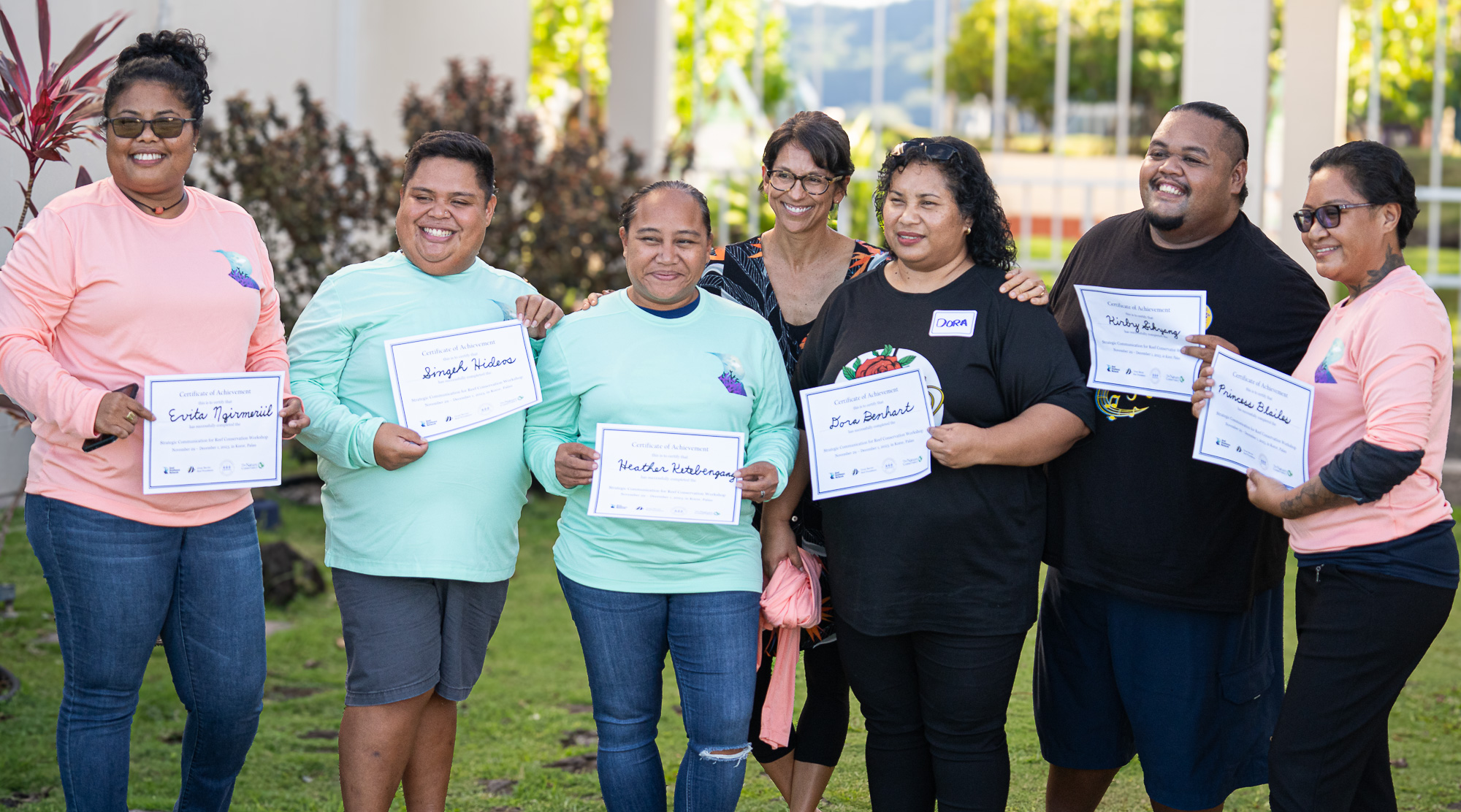Collaborative Efforts to Address Wastewater Pollution and Safe Drinking Water Concerns in the USVI
Location
Coral Bay, St. John, U.S. Virgin Islands
The challenge
The Coral Bay watershed is located on the east side of St. John, one of three main islands that form the U.S. Virgin Islands (USVI). It is comprised of several unique ecosystems including forests, salt ponds, beaches, mangroves, seagrass beds, algal plains, and coral reef systems. Failing wastewater treatment systems, stormwater runoff, and exposed trash are the primary potential sources of pollution to the watershed in Coral Bay, USVI. In the USVI, there is limited municipal infrastructure for providing drinking water and treating wastewater. Fewer than 25% of USVI households are connected to a municipal water system and 95% of USVI residents collect rainwater and store it in cisterns for household use. Cistern water is used as a primary or supplementary source for drinking water in the USVI, and Escherichia coli (E. coli) was detected in 80% of cistern water samples in a recent study. According to World Health Organization guidelines, E. coli should not be detected in drinking water. Given these circumstances, proper treatment of cistern water is critically important in the USVI.
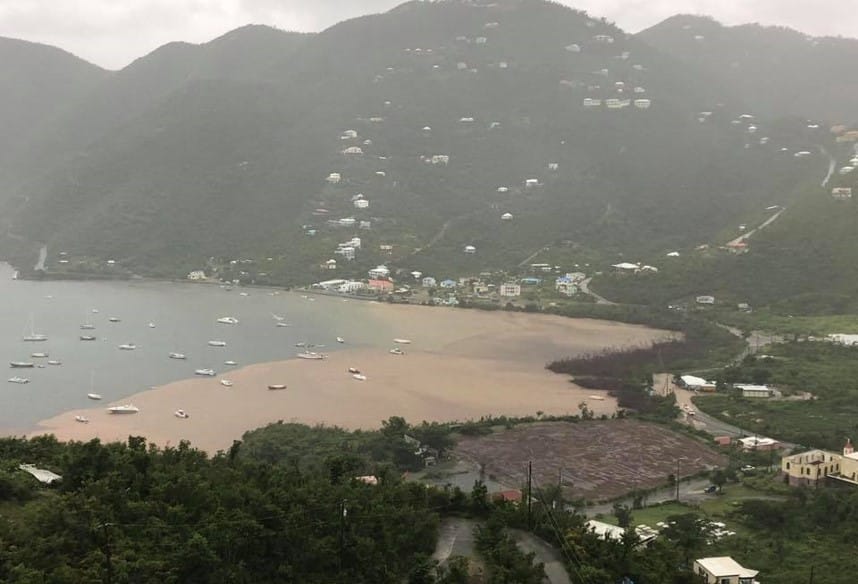
Stormwater runoff plume in Coral Bay November 2018. Photo © CBCC
Municipal wastewater services are also very limited; the Virgin Islands Waste Management Authority (VIWMA) estimates that between 30% and 60% of the USVI population is served by municipal wastewater treatment, with the remainder using individual septic or other on-site wastewater treatment. In Coral Bay there are no municipal water or wastewater treatment services available, and no plans for developing this type of municipal infrastructure. Private wastewater systems, when not properly constructed and maintained, can fail, causing environmental degradation of natural resources. Failure of on-site wastewater treatment systems has been cited as a major contributor to pathogen pollution of coastal waters and groundwater. Further, because of the local geology and hydrology conditions, most of the USVI is not suitable for septic systems which rely on filtration through the soils for adequate treatment. Similarly, alternative on-site wastewater treatment systems that use aeration methods followed by surface disposal may not effectively capture nutrients due to the shallow soils in many locations throughout the USVI. Pollutants from these inadequate and failed systems can harm the reefs surrounding the Virgin Islands. Coral reef ecosystems are critically important to USVI communities for subsistence fishing activities and provide substantial value through coastal protection from storms and tourism. Reef-based tourism alone contributes an estimated $492 million per year in direct and indirect spending to the USVI economy.
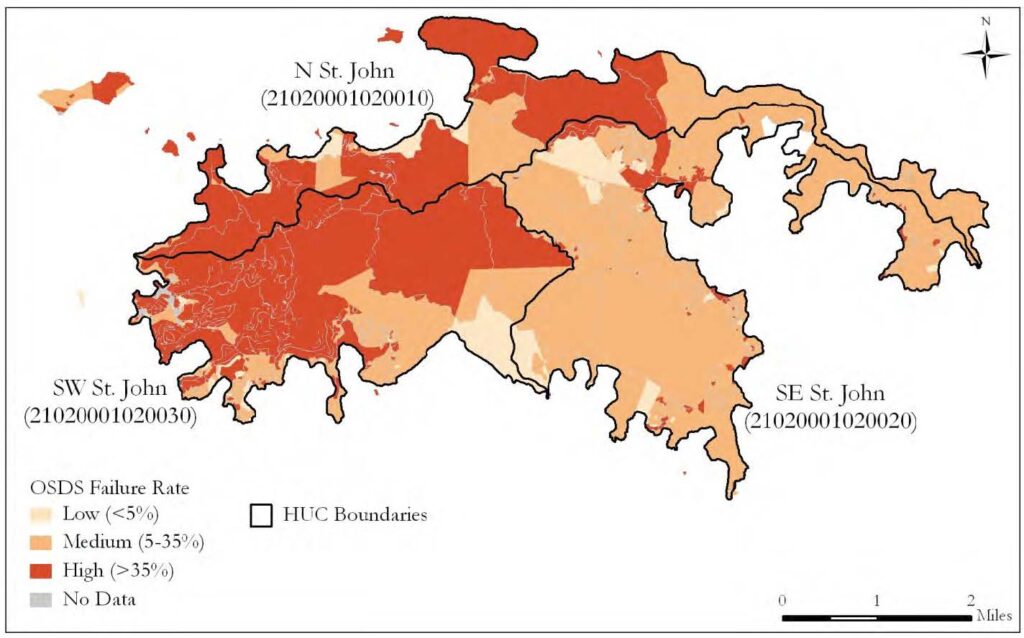
Map of Conventional Onsite Wastewater Treatment Systems Failure Rate © The Cadmus Group 2011
Actions taken
In its role as the local watershed management agency, Coral Bay Community Council (CBCC) enables effective cooperation among a diversity of partners. Through quarterly conference calls as well as periodic workshops and training events with professional stakeholders and government agencies, CBCC brings different sectors together to address wastewater pollution and drinking water issues in the USVI. Workshops enable a collaborative stakeholder network by gathering professionals in all fields of water and wastewater management to identify issues and develop practical solutions for the USVI. Workshops co-hosted by CBCC, and others including the USVI Department of Natural Resources (DPNR) and Resources for Communities and People (RCAP Solutions) occurred in 2015, 2018, 2020, 2022, and 2023. These events help the relevant agencies and partners understand local water supply and wastewater treatment needs and options, and provide input into the enforcement practices and strategic plans of the public agencies. Participants consider these workshops highly valuable in stimulating thoughtful ideas and solutions.
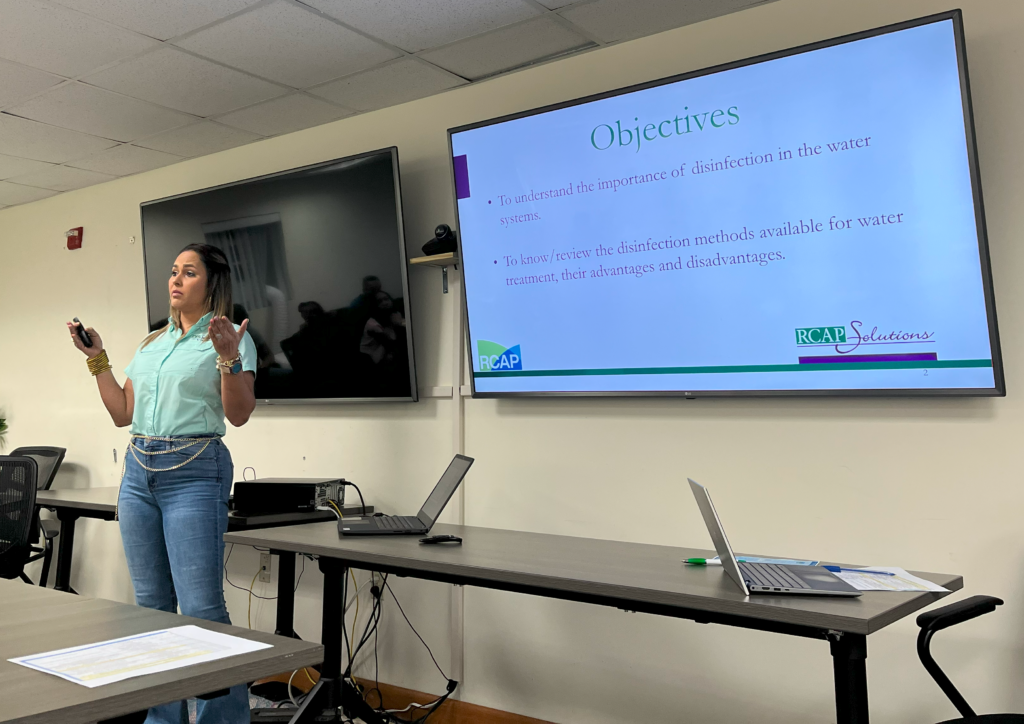
USVI Drinking Water and Wastewater Workshops July 2023 Photo © CBCC
Over 100 organizations are invited to attend the workshops; the July 2023 workshops were attended by more than 110 participants (including a mix of in person and virtual attendees). The workshop session presenters are from a variety of sectors including territorial and federal government, non-governmental organizations (NGOs), academic and private sectors. Content covered during the July 2023 workshops included:
- Wastewater treatment technologies
- Municipal infrastructure updates
- Water quality and wastewater effluent testing and monitoring
- Regulations related to wastewater and drinking water
- Drinking water treatment and disinfection methods and issues
- Operation, maintenance, and best management practices for residential water and wastewater systems
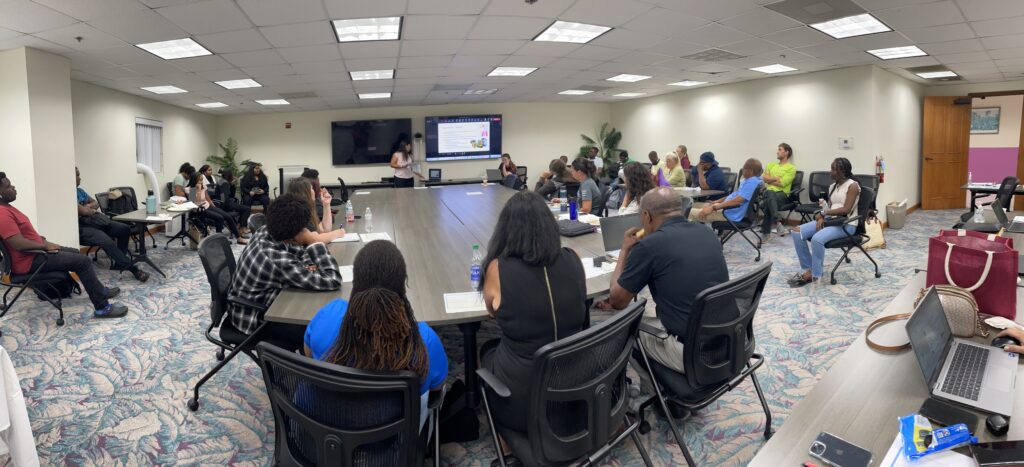
USVI Drinking Water and Wastewater Workshops July 2023 Photo © CBCC
More information on the workshops, including copies of the presentations, is available on the CBCC website. As a complement to the professional workshops, CBCC hosts a follow-on residential workshop to share information out to the community, connect homeowners with resources and fill the gap between agencies and end-users. The residential workshop provides hands-on training and assistance for residents to learn how to operate and maintain their drinking water systems as well as information to connect residents with professional resources to assist with wastewater treatment systems.
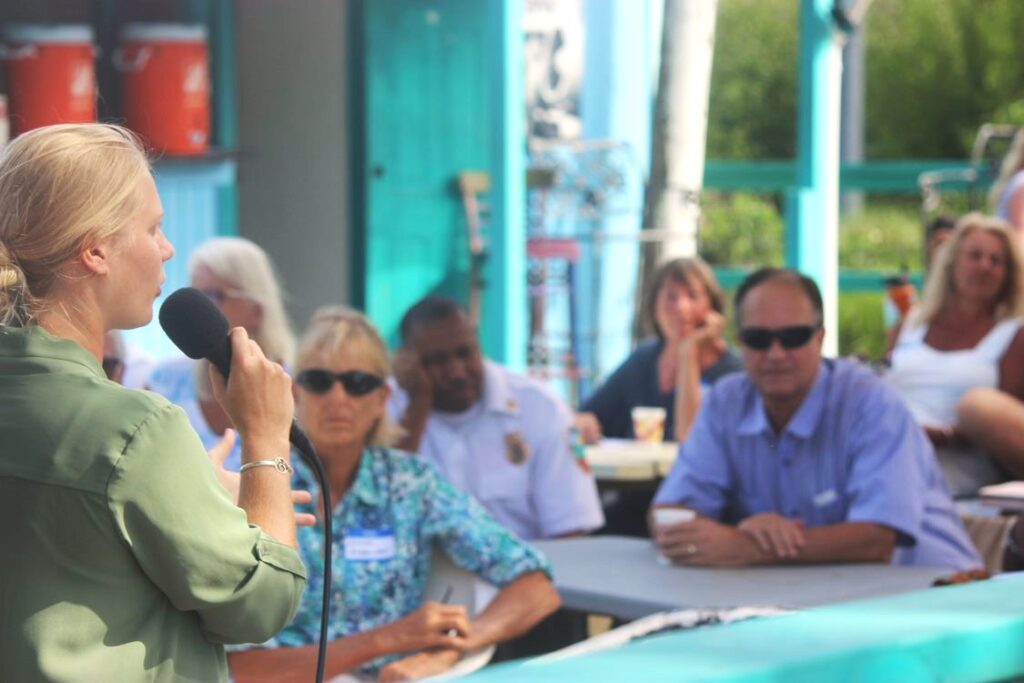
Residential Workshop 2022. Photo © CBCC
CBCC also hosts a quarterly conference call focused on USVI watershed issues to encourage collaboration efforts and provide updates on various agencies’ projects and activities. The calls provide an opportunity to develop a broad awareness of what each entity is doing and how it can impact protection of the Coral Bay watershed. Over 130 organizations are on the invite list and call participation averages around 20-30 individuals. Water, sanitation, and hygiene (WASH) organizations participating in this group include VI Waste Management Authority (VIWMA), VI Department of Health, VI Water and Power Authority (WAPA) and University of the Virgin Islands (UVI) Water Heroes among others. Other organizations participating regularly include: local and federal government agencies such as DPNR, VI Department of Public Works (DPW), U.S. Environmental Protection Agency, National Oceanic and Atmospheric Administration (NOAA), as well as various local non-profits, consultants and university researchers involved in local projects. Common topics include updates on ongoing efforts affecting the watershed such as: the USVI Comprehensive Land and Water Use Plan, specific watershed plans and studies, NOAA and DPNR coral reef related activities, DPW road projects, UVI Hydrologic & Hydraulic studies, and the USVI Hazard Mitigation Plan.
How successful has it been?
The workshops and ongoing quarterly calls have helped strengthen collaboration and partnerships between organizations that are typically working in silos, including local NGOs, government agencies, research institutions, and consulting organizations. Participants are also stimulated in their daily work activities by having contact with others who share their pollution concerns. Through the exchange of information during quarterly calls and workshops, new and more effective means to address wastewater pollution and safe drinking water are developed. Examples include:
- Identification of areas in need of further research to guide policy/regulations: CBCC presented its research illustrating the high potential for failure of onsite disposal systems. CBCC emphasized the need for additional research with greater sample sizes across the USVI to gain a better understanding of the efficacy of current regulatory policies. Similarly, a researcher from Arizona State University provided valuable information on a pilot program for water treatment using ultraviolet filtration, and a suggested framework for next steps towards providing sustainable access to potable water for households.
- Highlighting areas in need of outreach/education: One session raised awareness of the fact that residents are not typically informed that the effluent from their aerobic wastewater treatment units is not supposed to be used for surface irrigation unless it is further treated, or deposited six inches underground. Homeowners and vendors are often unaware of this, indicating a need for outreach and education. Another presentation focused on the hazards of chlorinating water in cisterns, due to the potential for formation of disinfection byproducts. Households in the USVI often use chlorine bleach to treat cistern water; the discussion raised awareness of the need for clearer guidance and outreach to change this practice. Future efforts are planned to provide this information to the community.
- Increased awareness of available resources: Professionals attending the workshops were pleased to learn that the UVI lab now provides wastewater testing services, expanding on-island capabilities for services that were previously only available at one other lab or by sending samples off-island. Homeowners attending the residential workshop learned about the availability of technical assistance from CBCC, RCAP, and other professionals.
- Avoiding duplication of effort: CBCC and other organizations are able to take advantage of studies and research produced by each other—therefore disseminating better information on effective practices. For example, through the workshops, CBCC learned more about studies of cistern water disinfection techniques that had been completed by another NGO on the island. Future efforts can be combined to focus on determining the most effective, safe means of treating drinking water and educating the public.
In addition to the workshops, through its role providing technical assistance to the community, CBCC has assisted homeowners and a housing development—connecting them with resources and training which has led to improved water quality. At the housing development, end users report substantial improvement in odors that had been disseminating from treated graywater reused in toilets and irrigation systems. Improvements are also evident on a larger scale, as recent water quality testing throughout Coral Bay has shown that the water is safe for swimming and recreation.
Lessons learned and recommendations
- Include relevant training sessions in the workshops, so practitioners are incentivized to attend.
- Consistency is important. Holding the workshops annually during the same week allows for organizations/participants to plan for and save the date to participate.
- Allow time for exchange of ideas, not just presentations. Also allow for virtual participation, in order to include a broader audience and encourage greater participation.
- Share resources after events. CBCC’s coordination includes posting all the presentations on its website after the workshops and circulating notes from the quarterly meetings. This follow-up results in better engagement and ease of sharing information. In addition, CBCC creates handouts for community residents to educate them about various topics and available resources—these are available at the CBCC office and online.
- Build a coalition of stakeholders to plan for sustainable access to potable water for all households in the USVI. As recommended in one of the presentations, this would be an effective method to move the USVI towards an important goal of potable water access. Such a coalition can agree on a framework and develop objectives, timelines, approach, and processes.
Funding summary
CBCC work is funded by U.S. Department of Agriculture—Rural Utilities Service Technical Assistance and Training grant program. DPNR provides space for the workshops. DPNR and all other agencies/organizations provide staff time for those organizing/attending.
Lead organizations
CBCC, DPNR, and RCAP Solutions
Partners
Arizona State University
Environmental Protection in the Caribbean (EPIC)
Horsley Witten Group
National Oceanic and Atmospheric Administration
Palms Property Services
Seven Seas Water Group
The Center for Watershed Protection
U.S. Environmental Protection Agency
University of the Virgin Islands
VI Conservation Society Eco-Schools
VI Department of Health
VI Waste Management Authority
VI Water and Power Authority
Resources
Wastewater and Drinking Water Workshops website
CBCC Water and Wastewater Information

